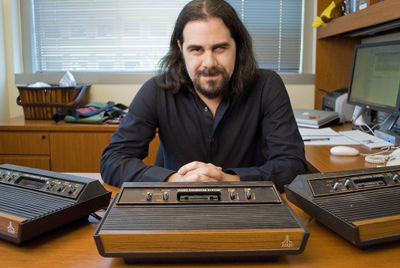Difference between revisions of "Comments"
| Line 36: | Line 36: | ||
Cool! | Cool! | ||
| + | |||
| + | [[File:IanBogost.jpg|400px|thumb|right|Mr.Unit-Based Analysis himself, Ian Bogost]] | ||
| Line 139: | Line 141: | ||
-Bliss | -Bliss | ||
| − | |||
| − | |||
Revision as of 00:29, 7 November 2017
Rather than write a summary about what I learned from this week's reading, I decided to simply copy/paste the comments I made while annotating the Ian Bogost -- I will limit it to the introduction and 1st chapter of his book. I felt it would be interesting to look at these comments I made in a new light -- that is, stripped from its original context of Ian Bogost's book. Hope I'm making sense!
INTRODUCTION Aim? His Theory is that contemporary literary analysis similar to computation
Move/Swing Back
Hardwork
Video Games controlled by the market
Still unsure what that means
Interesting
True
Yes!
Jargon is a unit?
?
Criticism is a toolbox
Give a working definition of Ludology
Just talks about game theory
Video games are different!
Interchangeable
Only part you care about!
Cool!
Chapter 1
? What
So its not like system operations?
Unit operation interpret networks? What networks?
System operations = literary authority
Bleh. Just filler about bio.
Unit operation = function
System = Context
Not as simple as binary opposition
New definitions for systems derived by networking of components
More genome bleh
Meh just talking about the history of the shift from system -> unit complexity
Definition time!
Systems can be units to other systems! Wow!
Unit =/= object because of c.s definition
Unit = object
Units are everything
Should I care about Luhmann?
Ok. Makes sense
Problems with system operations
Less focused on discovery with complex
Yikes. Heidegger
All this Heidegger talk
Operation is the transformation of input
How abstract
Heidegger = Software engineering
Why do you repeat yourself?
No principle only function and logic
God & Nature = Unit..
1 Substance, many modes
Useless paragragh
Ok here we go
ball of TWINE
Spinoza more digitial
Cantor: Coherent totality
Contain the infinite through set
Count as one & Situation
Every one is a multiple =/= no unit
One = operation
Being belonging to a situation
meh review
Badiou configuring multiples to one
Procedurality in computers the ability of formalizing many units
Problem with count as one
Unit operation universal shouldn't be limited
Procedularity and literary formula
Unit analysis good for unpacking
Example of unit analysis
Good example
Interesting
-Bliss
